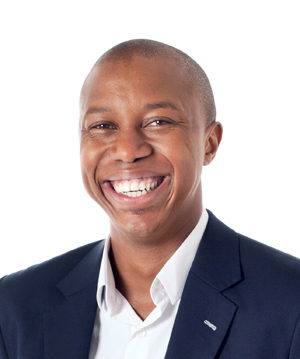UCT alumnus powers ahead as one of South Africa's leading young entrepreneurs
09 June 2016 | Story by Newsroom
Former UCT information systems student Katlego Maphai is powering ahead as an entrepreneur through his innovative venture Yoco ─ and going global is within his sights.
Yoco has developed a low-cost card reader and point-of-sale app which can be used with a either a mobile phone or tablet to process card payments quickly and easily. The concept, which is key to Maphai's vision to help small businesses grow, has been heralded as a great success. Since the first transaction in October 2014, hundreds of businesses in South Africa have been signed up every month.
The beginning
Maphai's interest in entrepreneurship was ignited when he was still at school and travelled with his academic parents to California's Palo Alto – the home of Silicon Valley. The open thinking of Silicon Valley resonated with him and he enrolled in a business science degree at UCT in 2002, majoring in information systems (IS).
“I felt immediately with IS that I was getting the best of both worlds – technology and business.
“I developed what I consider to be my primary strength during the IS programme – understanding the context and then deconstructing large complex endeavours into smaller, simpler, interconnected pieces.”
Maphai says his greatest learning experience within UCT's IS programme was the Group Systems Development Project in his third and fourth year. Together with a team of five, he had the opportunity to build an end-to-end software solution for an external business.
“I learnt some of my greatest lessons about teamwork, planning, execution, problem-solving, stakeholder management and being thorough during the year-long course. These are incredible lessons to learn before entering the workforce.”
The experience
Together with other UCT IS graduates, Maphai was snapped up by Accenture for his first job working in the communications and hi-tech industry. Here he had his first exposure to mobile technology, including mobile money and mobile banking.
A stint with Delta Partners, a telecoms, media and technology advisory and investment firm, followed in 2008, where Maphai was involved in the roll-out of 3G in Zimbabwe and the launch of a mobile operator in West Africa. It was also during this time that he met fellow Yoco co-founder and now commercial director, Carl Wazen.
“Living in Dubai at the time, and working in tough Saudi Arabia, Carl and I made a pact while on holiday with friends in Cape Town to eventually move there and start a venture. It was a special way to decide to come back home,” says Maphai.
But it was a while before they could achieve their dream. Maphai first worked for Rocket Internet, a newly formed German venture capital company and incubator for online start-ups, where he met and worked with future Yoco co-founder and risk and compliance director, Bradley Wattrus. They were part of the core team that set up Jumia.com.ng in Nigeria, now the largest e-tailer in Africa.
The team
Armed with experience, Maphai felt ready to work on his own venture. He approached childhood friend, Lungisa Matshoba (now Yoco's technology and product director) to join him.
The foursome of Maphai, Wazen, Wattrus and Matshoba began looking for a business model. They brainstormed several ideas, including an interactive wine bar, but settled on point-of-sale payments.
“More than 27 million people in South Africa have bank cards, yet only six percent of sellers accept cards. We realised there was a huge gap for small businesses who need to sell their products and services. Applying for a traditional card service takes time, requires trading history, a contract and is prohibitive in terms costs for smaller businesses.”
But Maphai and his team have had to have the courage of their convictions.
“We were cautiously optimistic, driven by the knowledge that we could solve a real problem. People thought we were crazy to think we could get a licence to participate as a start-up in the industry. I guess we were crazy; it took a year to get it and eventually find out whether we could even start the venture.”
But they persevered and succeeded.
“Seeing our first transaction in October 2014 was incredibly special and the culmination of two years of hard work.”
For Maphai, the possibilities are endless – and going global is within their plan.
“We see ourselves as a pan-African venture. We want to empower the growth of entrepreneurial businesses in Africa by making it easier to do business by using smart technology, insights and keeping things radically simple. Gone are the days where you wait to dominate your home market before you start thinking offshore. In the information age, things no longer work like that.”
The advice
Maphai sees the information technology sphere as one of the hottest careers of the future, with IS at UCT as a great springboard.
“The programme encourages and has space for broad thinking. You can focus on anything from project management to application development. The leaders in the faculty also have an eclectic mix of speciality backgrounds.”
And for students who are keen to become technology entrepreneurs, he has this advice:
“You need to read widely and then build a mental picture of what it takes to put together a venture. The moment your thoughts get complex and you cannot explain the steps, you are probably doing something wrong.
“It's critical not to think in constraints, even though they exist. Innovation emanates from unconstrained thinking. And finally, there's no avoiding failure in one form or the other, so jump in, fail fast, learn and move on.”
Story Kim Cloete. Photo supplied.
 This work is licensed under a Creative Commons Attribution-NoDerivatives 4.0 International License.
This work is licensed under a Creative Commons Attribution-NoDerivatives 4.0 International License.
Please view the republishing articles page for more information.










